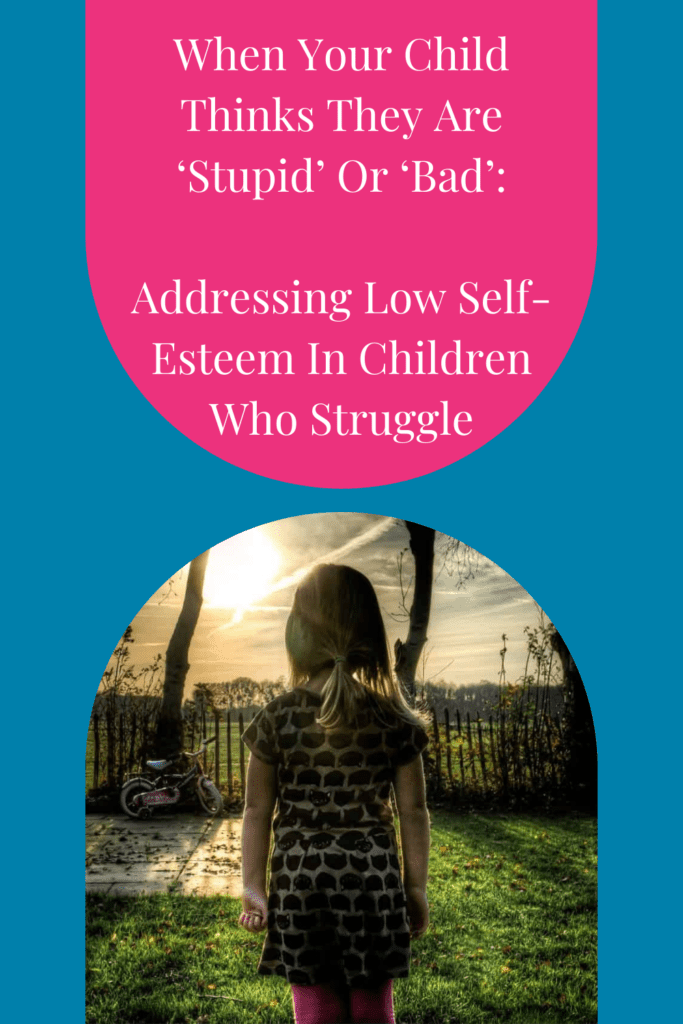“I’m stupid”. “I’m bad.”
When your child says that, it’s like a punch to the gut. There is nothing worse than seeing your child’s self-esteem erode when they are already struggling with learning and behaviour issues.
What’s interesting is that even before a diagnosis when moms have that gut feeling that their child is not quite progressing or developing like other kids, they hit the Google machine.
Often they already have a suspicion of what could be wrong: ADHD, dyslexia, a learning disability or even autism. Google is great for providing all sorts of signs and symptoms – am I right?
Low Self-Esteem – The Silent Epidemic in Kids Who Struggle with Learning & Behaviour
… yet when it comes to learning and behaviour disorders, rarely is low self-esteem or low self-confidence listed. We so rarely talk about the impact of these disorders on a child’s self-image and how that alone can actually exasperate a condition or compound the issue.
For example, if a child has a learning disability, low self-esteem can result in them deciding there is no point in trying because they are ‘stupid’. This negative belief can further confirm to them that they are unable to learn as they fall further and further behind in school.
The Perspective That Most Kids Don’t Have
Most of us all know that when we enter anything with a negative belief or attitude learning becomes that much harder. Most children won’t have this awareness and will see attribute any struggles as a further confirmation that they are ‘stupid’.
The same is true for kids who believe they are ‘bad’ because they struggle with focus, impulse control, hyperactivity or social skills. The core problem starts with shame.
Shame and the Self-Fulfilling Prophecy
Shame is when a person believes they are bad and this leads them to believe there is nothing they can do to change this because there is something innately wrong with them. We see this all the time with kids who get it in their head that they are the ‘bad kid’ and they fulfill that ‘role’ as if they themselves have come to believe they can’t be anything else.
This is precisely why addressing low self-esteem is such a crucial part of overcoming learning and behaviour challenges.
1) Self-esteem is Earned
That phrase came as a shock when I was younger and was struggling myself with low self-esteem. It was a hard pill to swallow. I’ve since heard it over and over again by various therapists.
This does not mean that low self-esteem is a child’s fault, BUT self-esteem cannot really be given to a child. We gain self-esteem by doing things for ourselves.
As adults we feel worse about ourselves when we procrastinate, don’t commit or follow through on things we said we would. We gain self-esteem and self-confidence by overcoming challenges and experiencing the success of our achievements.
This is precisely why so many kids who struggle have low self-esteem, because they are not experiencing success in school, with friends or even at home.
2) Focus on What They Do Well
Every person on the planet has a gift. I truly believe that. In order to build a child’s self-esteem, we have to stop focusing on what they can’t do. Certainly, we want to improve their reading if they have dyslexia, but we also need to make sure that we are highlighting their strengths.
If a child excels at a certain sport, drama, math, dance – or anything else, invest in nurturing that gift to prove to them that they can excel. Encourage your child to try challenges that you know they are likely to succeed at.
For example, if you know they seem to be proficient in music, then sign them up for music classes so that they can experience the natural process and progress of learning something new.
The more they see that they can overcome the challenges of learning something new and even master that challenge the better they will feel about themselves.
Teaching your child to stick with something is also a key component of this. If we allow our children to give up too easily, then they might assume they couldn’t learn something when it was actually because they didn’t push past the natural challenges and frustrations that we all experience with learning something new.
3) Teach Growth Mindset
As your child engages in activities that are challenging, teach them that a ‘fixed mindset’ is the belief that they can’t learn something or overcome a challenge or new skill while a ‘growth mindset’ is the belief that any skill can be acquired with persistence and practice. This ties back to the previous point of learning to stick with a new activity even if it does seem frustrating.
4) Stop Calling Your Child Smart
And stop over-praising! Yeah I know. This sounds insane, but bear with me.
Believe it or not research found that overpraise can actually have the reverse effect on children. When we overpraise we teach children to rely on external sources to fuel their motivation. Even worse children rely on it as a source of self-esteem to the point where they were found to stop attempting something if they think they could fail and then suddenly not feel or look ‘smart’.
I had heard this years ago as a teacher but didn’t really believe it. I continued to tell my daughter how smart she was all the time. The result was shocking.
She did not want to read more challenging books or attempt harder challenges and she became perfectionistic with her work. I later learned that perfectionism is also a common result of over-praise.
Perfectionism is not the gift we think it is. It leads to anxiety instead of excellence and tends to result in kids (and adults) not trying something if they think they can’t do something perfectly because it could compromise their self-image.
Studies also found that when small children received excessive praise for every simple task they do, they will start doing a task simply for the praise not for the purpose of the task.
It was found that when a child did a drawing that was mediocre, and the parents praised them – the child stopped trying as hard because they knew either way, they would get praise.
Children also became less trustworthy of their parents’ praise if they were over-praised because they knew no matter what they did, their parents would say their work was wonderful.
Children who received genuine praise for tasks were more likely to have intrinsic motivation, were more likely to take academic risks and were more likely to believe their parents when they did praise them because it wasn’t handed out like candy.
So – I’m going to say it again. Stop telling your kid they are smart. You’ll learn more about that in a moment but what has been found to be much more effective in increasing self-esteem, as well as motivation is to praise in moderation and when you do praise, focus on the skills. So instead of saying ‘You’re so smart” after they read a book, you might say:
“I loved how you didn’t give up.”
“That was great how you took the time to sound out the words one letter a time.”
“I loved how you stayed calm even when your work became really frustrating.”
“You are such a hard worker. You completed that entire sheet on your own!”
This is what builds growth mindset. It’s skills and certain behaviours that lead to success, not abstract ‘smarts’.
5) Teach Your Child About the Ingredients for ‘Smart’
I know as a mom the word you might hate the most is the F word but for me it’s smart. Truthfully, I don’t really believe in smart. It’s like a mythological concept that can seem impossible for struggling kids to ever achieve.
… and it’s not abstract if we break it down. First of all – what is smart? It typically has to do with having a certain set of skills that allows a child to be able to excel at different tasks and subjects.
Those skills must be developed – they don’t just happen. As I have written in previous blogs, many children struggle with learning or behaviour because they may have bio-chemical imbalances, or they may lack or have weak connections in their brain that make it challenging for them to do tasks that come easily to other children like reading.
Once those connections are strengthened, then real improvements can happen at an accelerated rate.
Other ingredients that rarely gets talked about is that for a lot of people, what appears to be ‘smarts’ has to do with certain skills like patience, remaining calm through the frustrations, resilience, grit (meaning sticking with it), as well as problem solving.
Rarely do we recognise those traits as being the ingredients that lead to what our society calls smart.
The more we can point out to our kids what can help them be more successful (while acknowledging their current limitations) the more it will seem possible for them to experience success.
6) Talk About Different Kinds of Smart
I used to have a banner in my classroom that read “It’s not how smart you are, it’s how are you smart.”
Schools are typically built around testing one type of intelligence. If you have a different kind of smart, then you don’t fit. If you’re really unlucky, you might have a learning disability (AKA Learning Difference).
Researcher Howard Gardener outlined the eight different intelligences he discovered. Having your child take this quiz to help them realise their own intelligences can help them to realise that they have competencies that just might not be part of what the school system evaluates or values.
I always make a point to talk to my clients and students about how in previous cultures, reading was of little importance and that the athletic people who could hunt and survive and build were most valued. Another group in Africa values being artistic as the highest intelligence.
Taking the time to teach our child that intelligence is a social construct can help them immensely. Make a point to notice the different intelligences of people you both know. Perhaps Uncle Bob is really mechanically minded, and someone else in the family excels at social skills.
Building your child’s self-esteem is so much more than trying to reassure them they are worthy. It means helping them to realise everyone has struggles and they do have unique strengths and gifts. Building on those strengths in order to minimize the impacts of the areas in which they do struggle can make all the difference in your child’s self-image.
Addressing the Root Cause is Still Key
Addressing the root cause of why your child is struggling rather than patch jobs approaches is key. This is why I am so passionate about therapies that nourish and strengthen weak connections in the brain such as my programs The Full Potential Formula and the Reading Rockstar Method.
Set up a free Better Brains Breakthrough session to learn more about how you can help your child rise to their full potential by addressing and correcting the root cause of their struggles.


